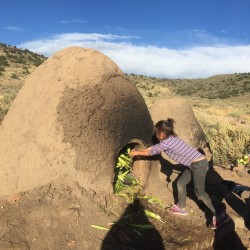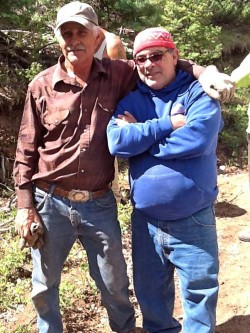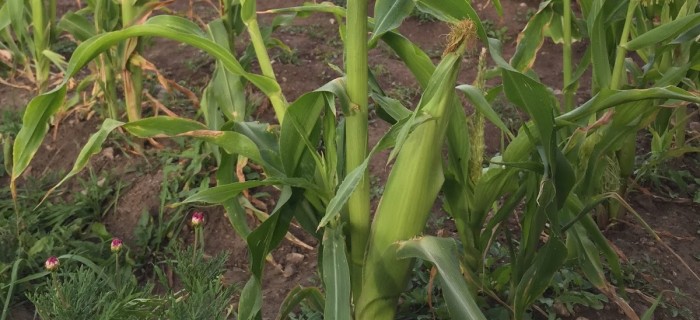Acequia Farmers NonGMO Movement Set to Declare Ban on GMO
NonGMO Movement | Acequia farmers in Colorado set to declare ban on GMO corn and alfalfa
Costilla County introduces ordinance establishing a GMO-free zone to protect traditional farmers’ varieties CULEBRA WATERSHED IS A CENTER OF ORIGIN AND DIVERSITY OF MAIZE
Devon G. Peña | Viejo San Acacio, CO | November 12, 2015
THE CENTER FOR FOOD SAFETY (CFS) has issued a press release this morning announcing support for a new ordinance introduced today in Costilla County, Colorado that would establish a “Center of Origin” GMO-Free Zone of Protection to preserve the county’s unique agricultural products and traditional farming systems. The ordinance is intended to protect the county’s traditional acequia (community irrigation ditch) farmers and their land race heirloom maize varieties that are unique to the Upper Rio Grande watershed. The GMO-Free Zone will help traditional and organic farmers avoid the serious risk of transgenic contamination from nearby genetically engineered (GE) crops, particularly GE corn.“We have the oldest water rights in Colorado and the oldest heirloom seeds. We are working to make sure both are protected,” says Delmer Vialpando, a local farmer and President of the Sangre de Cristo Acequia Association, one of the local partners that developed the ordinance and supports passage.
Current estimates show that the short and longer term value of GMO-free native heirloom seed stocks developed by Culebra watershed acequia farmers will contribute an additional $3-5 million in annual economic, ecosystem, and amenity values to the local economy. As the GMO-free branding of local acequia crops develops and is further marketed these values are expected to increase significantly.“Cultural and biological diversity are closely related and this is especially evident in the ‘Centers of Origin’ where indigenous farmers still develop varieties derived from uncontaminated parent lines of maize,” explains Dr. Devon G. Peña, a farmer and President of The Acequia Institute, a non-profit that operates a grassroots extension service and agroecology acequia farm on 181 acres in San Acacio, CO.

Local farmers in Costilla County are known for their adobe oven-roasted white flint corn (maíz de concho) which are called ‘chicos’ when prepared this way. Slow Food USA includes chicos in the Ark of Taste. Photo by Devon G. Peña
Local farmers in Costilla County are known for their adobe oven-roasted white flint corn (maíz de concho) which are called ‘chicos’ when prepared this way. Slow Food USA includes chicos in the Ark of Taste.
The acequia farmers of the Culebra watershed are celebrated as multigenerational seed savers and plant breeders. For over 170 years, they have developed unique land race varieties of maize, including maíz de concho (a native white flint corn) used to produce chicos del horno and pozol. The land race varieties of local corn are part of the North American “Center of Origin” for native populations of maize. These local center of origin varieties possess several unique and invaluable genetic characteristics including: adaptation to a very short growing season, adaptation to daily temperature extremes, and resistance to the desiccating effects of intense UV radiation at Costilla County’s high elevation.
Stay in the loop with Food First!
Get our independent analysis, research, and other publications you care about to your inbox for free!
Sign up today!
Center for Food Safety has long supported local regulation and prohibition of GE crop cultivation in order to preserve the rights of non-GE farmers and has provided legal and scientific counsel for the Costilla County ordinance. “Traditional farmers’ rights and seed choice must be protected and that means preventing transgenic contamination of their crops. We fully support Costilla County farmers in their effort to protect their livelihoods and autonomy,” said Amy van Saun, attorney at Center for Food Safety.
If approved, this will be the first center of origin GMO crop ban in the USA and the first conceived to protect native heirloom crops on non-tribal indigenous lands from the threats posed by transgenic contamination of ancestral and pristine land races.
Center for Food Safety previously worked with local residents and farmers to implement GE crop bans in several states, including two Oregon counties, one of which CFS defended in court. CFS also worked with the Oregon State Senate to ban GE canola in the Willamette Valley until 2019 in order to protect organic growers. GMO-free zones similar to the one proposed in Costilla include Jackson and Josephine Counties, OR, Santa Cruz County, CA, Trinity County, CA, Marin County, CA, Mendocino County, CA, Humboldt County, CA, San Juan County, WA, Maui County, HI, Hawaii County, HI, and numerous cities.

Delmer Vialpando and Devon G. Peña on La Sierra common lands, the 80,000-acre restored land grant of the Culebra acequia farmers. Photo by The Acequia Institute
The public hearing on the proposed ordinance is scheduled for November 18 at 1pm in the conference room of the Costilla County Land Use Planning Commission in San Luis, CO. The Commission will vote on the ordinance during the regular December meeting of the panel. More information on the meetings will be posted later this week and next.
If approved, this will be the first center of origin GMO crop ban in the USA and the first conceived to protect native heirloom crops on non-tribal indigenous lands from the threats posed by transgenic contamination of ancestral and pristine land races. Our hope is that this will unleash a similar movement in other communities that are centers of origin and diversification of maize. Many tribal nations are also working to adopt similar GMO crop bans to protect their native varieties.
In the coming days we will also be posting a detailed report prepared by The Acequia Institute in support of this historic ordinance. The report provides scientific evidence detailing how the local watershed was determined to meet the criteria for a center of origin designation. The report also provides background on the ecology, history, and unique culture of the bioregion and an analysis of the current state of agriculture in Costilla County. We will also be posting additional analysis and a link to a petition calling on the Costilla County Commissioners to approve the ordinance.
For more information and to arrange for press interviews with local organizers, please contact Dr. Devon G. Peña at:
Email: devonpena@gmail.com
Mobile: 206-228-4876


 Help Food First to continue growing an informed, transformative, and flourishing food movement.
Help Food First to continue growing an informed, transformative, and flourishing food movement.




